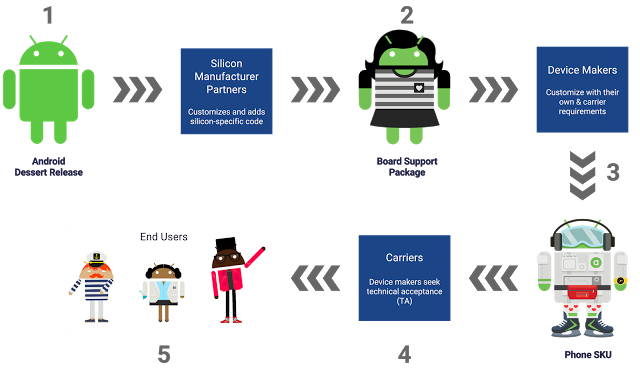Google’s Project Treble Will Help OEMs Deliver Android Updates Faster

In fact taking a look at the latest Android distribution figures, Nougat has yet to break the 10% mark despite having been made available for a while now. However the good news is that could change in the future moving forwards, thanks to a new Google initiative called Project Treble which aims to help OEMs issue Android updates faster.
According to Google, “The core concept is to separate the vendor implementation – the device-specific, lower-level software written in large part by the silicon manufacturers – from the Android OS Framework. This is achieved by the introduction of a new vendor interface between the Android OS framework and the vendor implementation. The new vendor interface is validated by a Vendor Test Suite (VTS), analogous to the CTS, to ensure forward compatibility of the vendor implementation.”
“With a stable vendor interface providing access to the hardware-specific parts of Android, device makers can choose to deliver a new Android release to consumers by just updating the Android OS framework without any additional work required from the silicon manufacturers.” Unfortunately Project Treble will not be applied retroactively on older devices, meaning that moving forwards only newer handsets with Android O and beyond will be able to take advantage of this. However the good news is that the current-gen Pixel handsets with the developer preview of Android O is already running the new Project Treble architecture.
You May Also Like
Popular Right Now
- Google Messages Rolls Out On-Device Nudity Detection With Sensitive Content Warnings
- Google AI Mode Adds Multimodal Search To Mobile App
- Leaked Apple Watch Series 10 Prototype Reveals Unique Health Sensor And Potential Future Features
- Canon Unveils PowerShot V1 And EOS R50 V: Best New Vlogging Cameras For 2025
- Bill Gates Predicts: AI Will Replace Doctors And Tutors Within A Decade
- First Shutdown of Niagara Falls in 12,000 Years: A Rare Sight to Behold
- Former Google Engineer claims that humans will achieve immortality soon
- Romotow: The Foldable Camping Trailer Inspired By A USB Flash Drive
- LYRA: Swiss Startup Unveils AR Smart Glasses for Office Work, City Life, And Traveling
- Man Caught in China Smuggling $46K Worth of Intel CPUs Wrapped Around His Waist
- iPhone 15 Pro Max may bring thinner bezels than Xiaomi and Samsung’s latest flagships
- OpenAI's new GPT-4 with a "human-level performance" scored up to 93% on SAT exams
- iPhone SE 4 could be Apple's secret weapon to 'steal' budget customers from Samsung
- Lenovo Launches New Workstations, With Aston Martin DNA
- Ubergizmo’s Best of Mobile World Congress 2023
- TCL NXTPAPER 11 Tablet With Paper-like Screen Experience